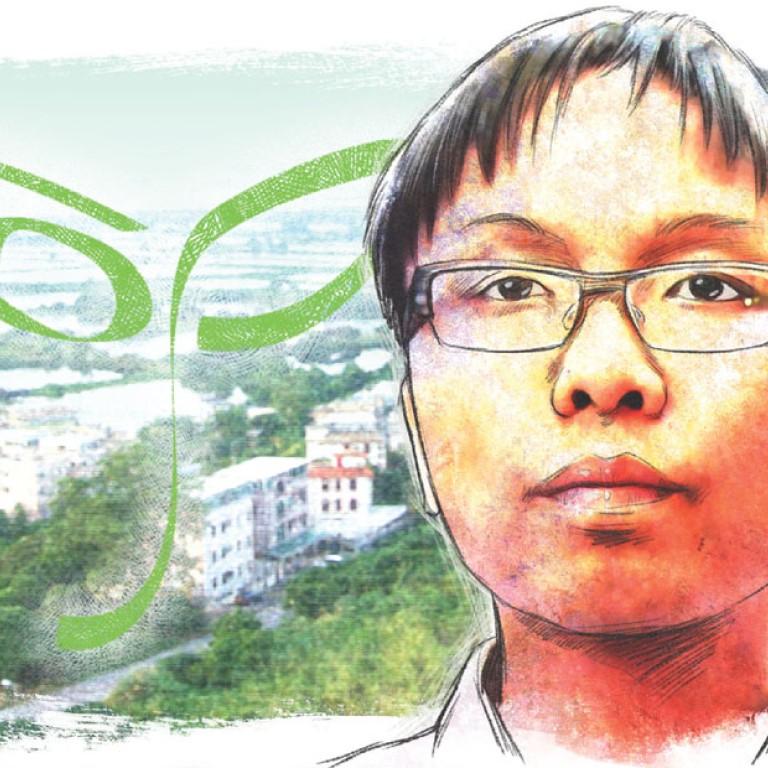
How mainland Chinese influx can damage the environment
Teacher and campaigner once dubbed the 'environmental Taliban' turns his attention to the effects of tourism … and a future in politics
Science teacher Roy Tam Hoi-pong is never far from waging a crusade against environmental damage.
For years, the co-founder of environmental group Green Sense went on the offensive against the construction of what he dubbed "walls of buildings" across the city that trapped air pollution while feeding the greed of property developers.
In these "wars on walls", Tam won some, lost most - and made himself a household name with his hard-hitting campaigns.
Political commentator Choy Chi-keung once dubbed him the "environmental Taliban". It was nothing short of authoritarian, Choy said, for Tam to ask a television station to stop screening two entertainment shows he said wasted food and involved unnecessary use of foam.
Is he really such an extremist? "Unlike the radicals, I won't go to the streets to confront the mainlanders," he said.
Now 33, Tam is drawing the battle lines on another front: to wall off Hong Kong from "external influences" jeopardising its unique culture and way of life.
The influences he refers to include the city's powerlessness in deciding who and how many mainlanders can settle in the city.
Then there is the Individual Visit Scheme, which he blames for overloading facilities while benefiting only small sections of society by letting travellers from 49 mainland cities enter Hong Kong without joining a tour.
These influences, Tam says, are the sources of environmental woes today and in the future.
"The environmental problems have become multi-disciplinary and are rooted in these influences, which are the reasons the government is scrambling for more housing land and endlessly expanding infrastructure to cope with travellers."
Not only is the city split on this battle, but even among like-minded activists in "Hong Kong localism", beliefs are disparate, as the concept can be interpreted as anything from nostalgia for the colonial rule, to preservation of the city's uniqueness, to exclusion of non-locals. "I am branded a member of localism, too, though I am at the mild end of the spectrum," Tam said.
What differentiates his mild localism from radicalism, he says, is method, not belief. "I focus on policy solutions, while radicals are more about taking action, which I think is necessary to amplify the message."
A solution he has raised is to set up a dedicated, closed area for mainlanders to visit and shop.
Tam said his non-threatening style could balance the bluntness of protesters who wheeled luggage around crowded shopping areas in mock imitation of mainland tourists and resorted to verbal abuse of Putonghua speakers.
"I would not call [mainland visitors] 'locusts', although I understand why others do. When they squat by the streets and shop in groups at malls, this might give others such an impression."
Nine years ago, Tam founded one of the youngest green groups in the city. As a rising "star campaigner", he used to hit television news headlines almost every week, with his eye-catching news releases and hardline stances.
Locals' irresponsible lifestyles were a prime target; he rolled out campaigns to discourage the use of disposable utensils and overuse of air conditioning.
"Walls of buildings" became a widely cited term through his high-profile exposure of planning flaws and developers out to maximise profits from every inch of land that created a "walled" effect, blocking air flow and trapping noise. In the most successful case, he forced the government to cut the number of residential towers on top of the Nam Cheong MTR station from 11 to seven.
Today, Tam is a diehard opponent of a third airport runway and the conversion of green-belt land into housing sites.
Politics is the way to go for him to make a change, he believes. In 2008, he made a bid for the Kowloon West constituency in order to fight for a green Hong Kong in the legislature, but just 1,603 votes were cast for him.
The defeat, ironically, only reinforces his determination to be part of the power centre. "Politics has always been my career path. And what I am doing matches the thinking of many Hongkongers," he said. "Sadly, many lawmakers have yet to wake up to that."
For all his endeavours, Tam puts up with his fair share of criticism. The "environmental Taliban" tag may be in the past, but now there is a blog widely circulated on the web, full of critiques of the media activities, campaigns and views of Tam and like-minded groups.
The person behind the "No Green Hegemony" blog is identified only as Karen Chan.
Tam laughs off the criticism, saying many like Choy still fail to understand what saving the earth means. "Ours is really a freaky city, tilting excessively towards economic development and the provision of infrastructure.
"Even if you follow the Roy Tam way, I am sorry to say we won't be able to save planet earth. We are still consuming far more resources available to us than others on this planet."
Roy Tam Hoi-pong
33
Graduates from Chinese University's environmental science department
Founds environmental group Green Sense
Runs for the Kowloon West constituency in the Legislative Council election
Starts teaching at Wa Ying College in Ho Man Tin
